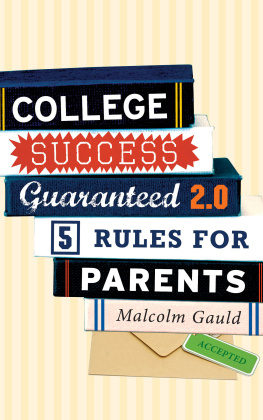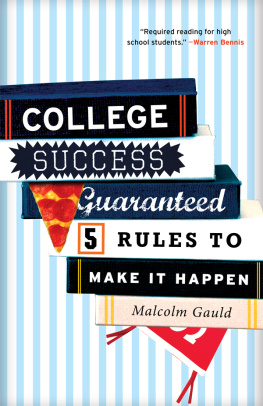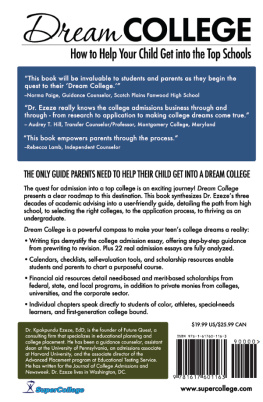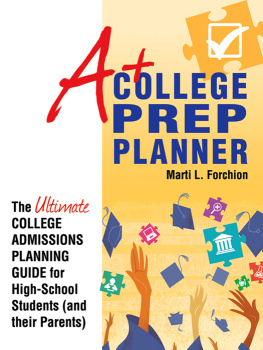College Success Guaranteed 2.0
Other Title by the Author
College Success Guaranteed: 5 Rules to Make It Happen
College Success Guaranteed 2.0
5 Rules for Parents
Malcolm Gauld
ROWMAN & LITTLEFIELD
Lanham Boulder New York Toronto Plymouth, UK
Published by Rowman & Littlefield
4501 Forbes Boulevard, Suite 200, Lanham, Maryland 20706
www.rowman.com
10 Thornbury Road, Plymouth PL6 7PP, United Kingdom
Copyright 2014 by Rowman & Littlefield
All rights reserved. No part of this book may be reproduced in any form or by any electronic or mechanical means, including information storage and retrieval systems, without written permission from the publisher, except by a reviewer who may quote passages in a review.
British Library Cataloguing in Publication Information Available
Library of Congress Cataloging-in-Publication Data
Library of Congress Cataloging-in-Publication Data Is Available
ISBN 978-1-4758-1073-8 (pbk. : alk. paper) ISBN 978-1-4758-1079-0 (electronic)
 TM The paper used in this publication meets the minimum requirements of American National Standard for Information Sciences Permanence of Paper for Printed Library Materials, ANSI/NISO Z39.48-1992.
TM The paper used in this publication meets the minimum requirements of American National Standard for Information Sciences Permanence of Paper for Printed Library Materials, ANSI/NISO Z39.48-1992.
Printed in the United States of America
To Gigi and Laurie,
My Sisters
Introduction
Get yourself fired as a manager.... Then get rehired as a consultant.
T. C. B.
The 5 Rules for... Your Kids
The Sequel: The 5 Rules for... You
Things Have Changed
Parents as Friends
Im Not the Only One
A Suggested Frame of Mind for the Reader
The Meter Starts Running at 30
A Few Words about Bullshit
Parent Stories and Anecdotes
The Offer of the College
T. C. B.
Since I began teaching high school students nearly forty years ago, I have watched thousands of high school graduates head off to college. In my early years I didnt give it much thought. Although saddened to see the kids move on, I would refocus my attention on the new ones following behind. After a while, I couldnt help but notice some unmistakable patterns relating to my students after they hit college.
Another thing I noticed was my poor track record in predicting how my students would perform in college. I often found myself surprised... both ways. Some of the kids I was sure would excel would turn around and bomb. And some of the kids I was sure would bomb would surprise me by the extent to which they would buckle down and get after it. Before long I gave up predicting. Instead, I set my mind to trying to identify and understand the behaviors that the successful ones appeared to exhibit.
As a high school teacher of U.S. history and government, I would seek to personalize the three branches of U.S. government (i.e., executive, legislative, and judicial) by off-handedly asking my seniors, So tell me, hows your executive function coming along? I would then use their look of puzzlement as an unintended invitation to seize the liberty to tell them a bit more than they wanted to know:
Yeah, well, you know, if your legislative function has to do with how well youre working with others, and your judicial function is all about whether youre acting wisely and honorably, your executive function is all about... T. C. B.
Correctly discerning that I was not about to back off, he or she would then usually take the bait: Uhm... what do you mean by T. C. B., Mr. Gauld?
Id then reply, I mean... Taking. Care of. Business.
I had come to realize T. C. B. is what success in college (and probably a very long list of other things) is all about. Its doing what you need to do when you need to do it. Its about the propensity to delay gratification when no adult authority figure is on the scene to remind (or make) you do whatever it is that you need to do. I cant vouch for how scientific this is, but I can say that kids who can master T. C. B. tend to do well in college and the kids who cant master T. C. B. tend to flounder. (And T. C. B. is also a very good post-college attribute to have!)
The 5 Rules for... Your Kids
About a decade ago, I began giving an annual talk to high school seniors in hopes of sending them off to college on a positive note. This led to my book College Success Guaranteed: 5 Rules to Make It Happen (2011).
My intention was to help college-bound students rise above the pitfalls waiting to snare them, the biggest one being the danger of drowning in free time. A close second lies in the failure to navigate the transition from homework, a short-term daily obligation (and a term they will never again hear after high school), to the long-term ongoing commitment of studying. And once again, this all circles back to the factor of how one handles free time.
As the title suggests, the book offers five rules to help the new college student begin and stay on track. In writing the book, I gathered anecdotes, tips, and strategies in interviews with college kids and recent grads from more than forty colleges and universities. Briefly, the five rules for college kids are:
Rule No. 1 Go toClass. Every kid Ive ever known who flunked out of college failed to go to class. (And Ive never known a kid to attend all of his or her classes and then fail.) High school penalizes you if you miss class; college may not even know if youre there. This is the most important rule, and yet, nonetheless, kids can have an amazing capacity to think that it doesnt apply to them.
Rule No. 2Study3 Hours X 5 Days per Week. You may need to do more to make Deans List; you may even get away with less. (Note: One of my daughters seemed to take particular pleasure in scoffing, for my benefit, Dad, I never do 15 hours per week. Meanwhile, the other would lament, I could never get by with only 15. For what its worth, they both did well.) My point is simply that if you study three hours per day (15 hours per week), regardless of whatever assignment might be due the following day, youll do fine. Also, Ive observed that the kids who will consistently do 15 hours are also the ones who will muster the initiative to jack it up to 20 or 25 when heavier work comes due. However, and heres the main point: Kids with no foundation of habit tend to flounder, freak-out, or both, once the academic pressure increases.
Rule No. 3Committo Something. While it might seem counterintuitive, college students who stay busy tend to do better than those who dont. Whether on an athletic team, in a play, or on the college newspaper, not only will such activities not detract from your academics, they will enhance them. It will also bring you into regular contact with other committed and industrious peers, causing you to establish a network that can prove to be of great mutual benefit in the decades after college.
Rule No. 4 Get aMentor. When I shared my book with University of Southern California Distinguished Professor of Business and leadership guru Warren Bennis, his first comment to me was, I only disagree with one point you make in your book, Malcolm. You dont get a mentor, you stalk mentors... and you stalk them your whole life! High school teachers are expected to be on the lookout for kids who could use some extra help in their academic or personal lives. In college, the burden falls on you, the student, to go out and make the connections that can propel you forward.






 TM The paper used in this publication meets the minimum requirements of American National Standard for Information Sciences Permanence of Paper for Printed Library Materials, ANSI/NISO Z39.48-1992.
TM The paper used in this publication meets the minimum requirements of American National Standard for Information Sciences Permanence of Paper for Printed Library Materials, ANSI/NISO Z39.48-1992.